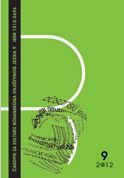GRAMATIKA GLAGOLA STANJA
GRAMMAR OF STATE VERBS
Author(s): Ivo PranjkovićSubject(s): Language and Literature Studies
Published by: Filozofski fakultet Univerziteta u Tuzli
Keywords: state verbs; verbal aspect; factitive verb; prefixation; space and time
Summary/Abstract: The paper focuses on the relationship between state verbs and some grammatical categories. In the first part the definitions of state verbs, which include verbs that denote the position of the body (e.g. stajati, ležati), verbs that denote existence and/or stay (e.g. postojati, boraviti), verbs that denote colours (e.g. bijeljeti se, zelenjeti se), verbs that denote rest/inaction (e.g. mirovati, šutjeti) and verbs that denote state of consciousness (e.g. spavati, bdjeti) are discussed. State verbs poses some specific grammatical characteristics especially when it comes to verbal aspect. Verbs of state are typically imperfective, so they do not have perfective counterparts. On the other hand, verbs that denote change of state (e.g. stati, leći) are typically only perfective. This is probably the reason why some claim that the aspectual opposition is actually based on the opposition between the state verbs and the verbs that denote change of state. State verbs also have some special characteristics when it comes to prefixes. In most cases when a prefix is added to a state verb it ceases to be a state verb, e.g. zastajati, pozelenjeti, some of them even become transitive, e.g. preležati gripu or prespavati polovicu filma, and those that do remain state verbs after a prefix is added always denote some temporal limitation that concerns the state, e.g. odležati u zatvoru pet godina or provoditi neko vrijeme u kavani. When it comes to the category of space, spatial relations characteristic of state verbs are those that are characteristic of the Locative case when it combines with the prepositions u, na and pri, e.g. ležati u krevetu, sjediti na propuhu, stajati na vrhu brda. Spatial relations expressed by Accusative + preposition are not typical of state verbs, compare *ležati u krevet, but these spatial relations are typical of verbs that denote change of state, compare leći u krevet. The specific characteristics of state verbs, especially verbs that denote stay, is also reflected in the fact that they are always accompanied by an adverbial, e.g. Ivan živi u Dubrovniku. Such an adverbial is actually a result of some sort of objectivisation of space which means that is just as obligatory as a direct object with transitive verbs (e.g. Razgledali smo Dubrovnik). Finally, when it comes to verb forms (tense and mood) imperative forms are not typical of state verbs, so they are used infrequently, and some of them are even unusual, e.g. stoji, leži, sjedi, etc. This is due to the fact that imperative forms of these verbs call for the state to remain unchanged and this is in communicative terms in most cases irrelevant, that is, redundant. Even if this is sometimes done, it is done in a descriptive manner, e.g. using the imperative of the verb ostati and infinitive of the state verb, e.g. ostani stajati.
Journal: Bosanski jezik
- Issue Year: 2012
- Issue No: 09
- Page Range: 11-24
- Page Count: 14
- Language: Croatian

